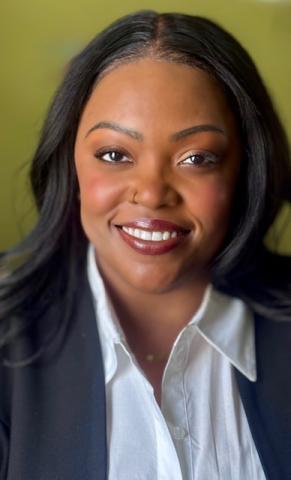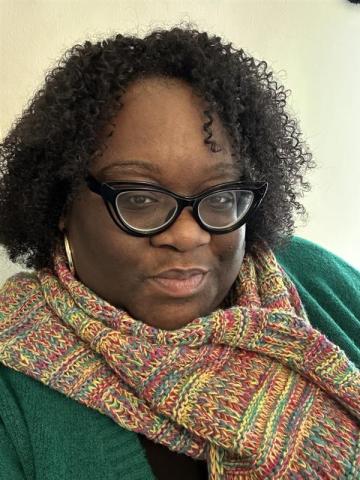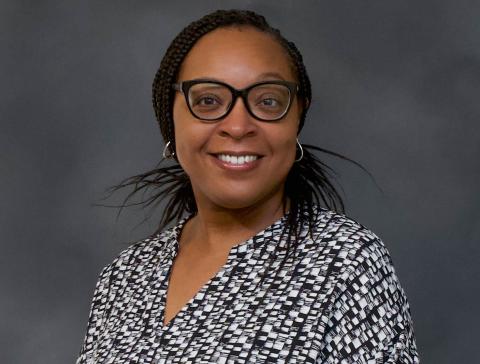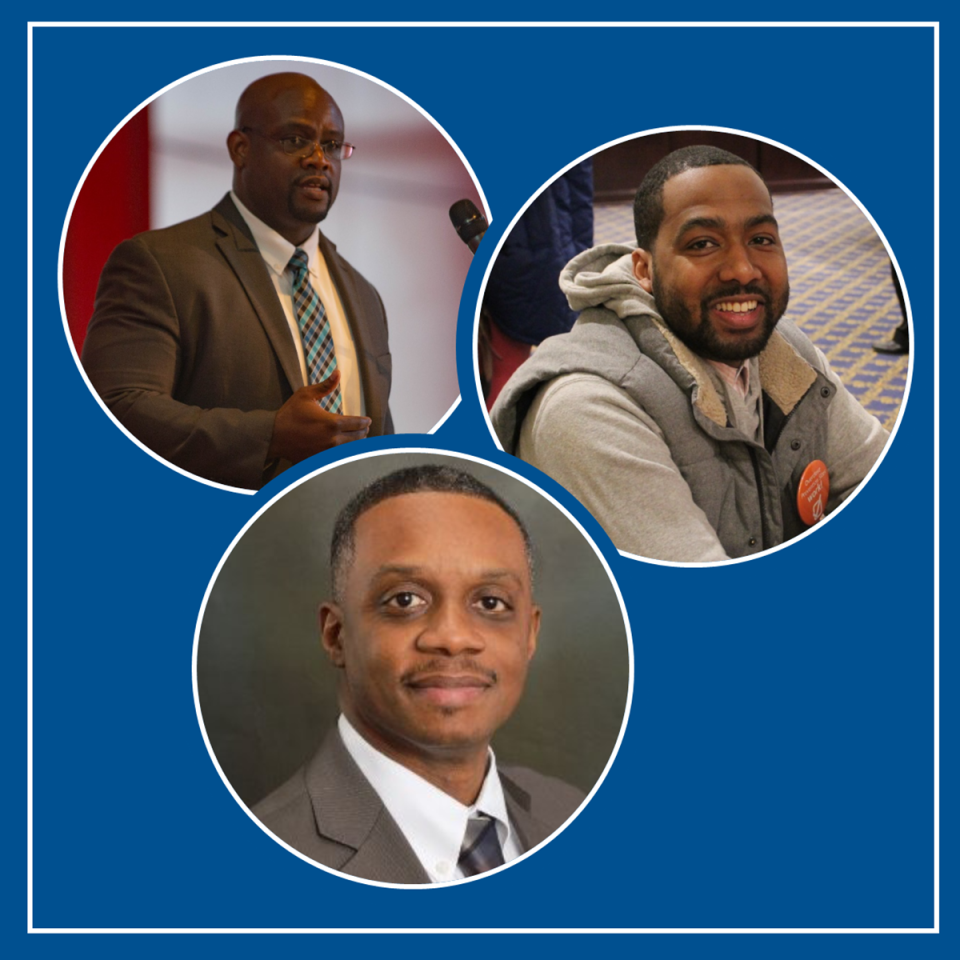
Racial Equity and Inclusion Should Be the Foundation: Liberation is the True Goal
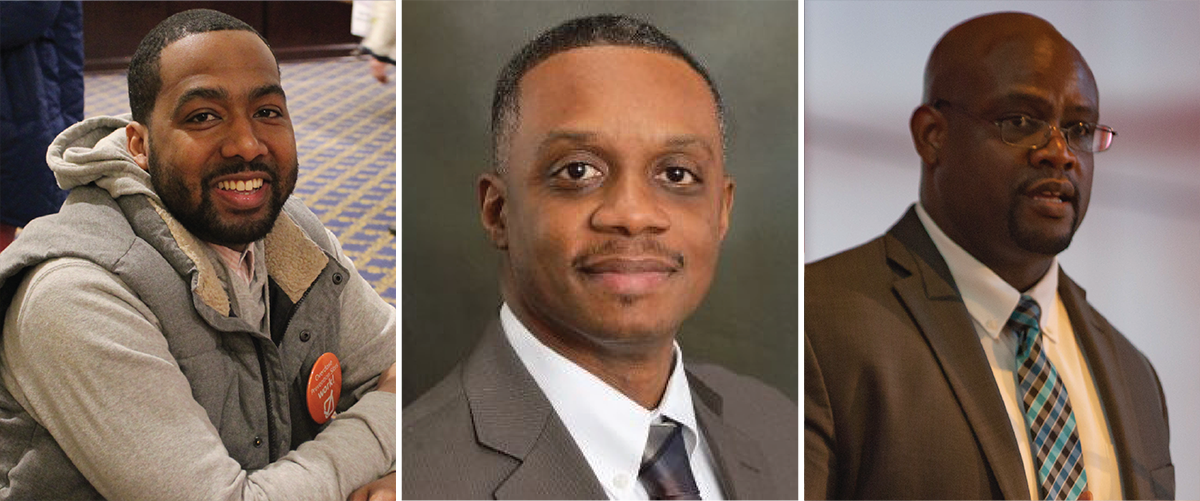
Accounting Manager Jeremy Givens (left) and Board Member Michael B. Jackson (middle) sat down with Senior Director of Equity & Engagement Eddie Martin, Jr. (right) to discuss their new roles as our respective Staff and Board REI Committee Chairs.
Martin: It’s exciting to have this conversation with two other Black men who will be pioneers in this space. Can you tell me what moved you to become agency leaders in our REI work?
Givens: It’s a pleasure to be here, Eddie. There isn’t a lot of Black leadership at Health Care for the Homeless, especially Black men. I felt I had a voice not often represented. So, I felt a great responsibility—I needed to accept that charge and be the one to step up. I think it’s important for the agency to see a Black man pushing this work forward.
Jackson: I couldn’t agree more. 2020 shined a spotlight on complex systemic problems that have existed for generations, but so many in power have had the privilege of ignoring them. These issues already existed—whether gaping health disparities, voter suppression, gerrymandering, or a lack of equity in criminal justice- they were already there.
Even in my “day job,” I see alarming industry statistics. As an example, for every $1 million that a white male founder raises for his start-up, a Black female founder raises an average of $36,000. This kind of inequity, that’s what called me. I feel obligated as a Board Member to leverage my influence to help make sustainable changes – starting from where we are.
Martin: Thank you both for sharing. I agree with you both. Many of us are teleworking, which provided us all with the opportunity to see the 8 minutes and 46 seconds with George Floyd. The elephant’s out of the room. These realities have always been there, as you said, Michael. African Americans are dying at 2.5 times the rate of white Americans during COVID-19. We know that in any crisis it is the distressed individuals who get hit the hardest and the fastest, and have to deal with its lingering effects.
Martin: What makes you hopeful that you will succeed in this work as committee chairs with the agency?
Givens: This is my first time spearheading this kind of work. I’m looking at things from all angles and doing my groundwork. Often I feel both the responsibility and the burden of being a Black male. But I’m also hopeful because of the diversity and training of the committee, and the clear intention and investment by the agency.
Jackson: As a Black man, disparities are a lived experience; they were already top of mind, an anxiety, a burden that we can’t take off. It’s important for me to raise awareness and use data to move people to action. I really take this responsibility seriously. I’m encouraged by the fact that we’ve been empowered here. I’ve seen the numbers as a Board member. I know we’re putting in the resources and the budget. This is not something that is a passing phase, and we’ll all work to make sure it’s not.
Martin: What impact do you imagine REI having in the lives of our clients, staff and board members, and what does success look like to you?
Jackson: We’re looking to address disparities, inequities and biases that exist in housing and health care. For instance, studies have shown that providers assume that Black patients are able to tolerate greater levels of pain. We need to make sure that we are identifying and addressing these kinds of harmful falsehoods in our own practices. As an employer, we’re looking to ensure racial equity and inclusion across the organization, including in our hiring, retention, promotion and compensation. Our efforts should be aligned with the needs of our community; we should be able to quantify our impact and hold ourselves accountable; and we will need to ensure that the changes are sustained over time. These efforts should continue with as much vigor as they start with, not fade away as the headlines do.
Givens: Through my experience here and at other community health centers, I have seen that clients are not always able to be treated by providers who look like them or have an understanding of what they’ve been through. Fixing that will be a big part of what success will look like. Also I’m hopeful that the committee can open up people’s minds, especially to things like implicit bias.
Martin: I hear from both of you that success is about our structure—how we look and how we practice. But I also hear you talking about cultural change. I want to be an individual, who, as a person of color, can feel the change, who doesn’t feel limited as a Black man in my position just because I am a Black man. For me, “inclusion” is a low bar. You can “include me” all day but not address issues of equity. Racial equity should be a bar that we cannot fall below. So let me add this thought: Our goal should be liberation. I want to be free. Free of the pains of racism, ranging from institutional and interpersonal racism, but also from the white supremacy etched within my own psyche.
Martin: What is at stake if we do not explicitly talk about race and work toward establishing racial equity as the foundation?
Givens: If we don’t talk about race, we become stagnant. We risk creating an echo chamber, resting on our past accomplishments and not reaching our full potential. We have to change culture, mindsets and hold the mirror up to ourselves. Let’s put the spotlight on our blind spots and then we can hurdle over them.
Jackson: I agree with Jeremy. Not to be hyperbolic, but I would say it’s a matter of life and death. If we don’t have these conversations, the inequities will linger and grow. We may not be able to impact everything within society; but here, where we deliver critical services and employ people, these changes have a ripple effect. We need to think big. I want us to dig in and really think big to impact long-term change. And we have to be careful not to dilute or lose the focus specifically on racial equity—we cannot let this happen.
Martin: To your point, Michael, the ability to drift away from racial equity work is privilege. We, as Black people, can’t “opt out.” We have to deal with these realities every day. We have to think about the balance between grace and accountability. We have to think about transformation, not just performance. This leads me to my last question: What advice would you give to those who may feel uncomfortable leaning into this work or doubt that the agency will succeed in this work?
Jackson: We can’t place the catalyst for change solely on the person who has been treated unjustly. We have to take the first step together, starting with what we have in common and then empathize—not sympathize—with the person you’re talking to. It’s awkward, but the relationship will be stronger for it.
Givens: Lean into the uncomfortable conversations. That’s where growth and change happens. Appreciate the moments of discomfort because we will be better for them. Come to the conversations in good faith and empathy. To colleagues who doubt work we’re doing, my response is don’t lose the faith in the organization—we’re going to push forward.
Meet the other members of our REI Committees
More Recent News
We are thrilled to welcome Nikia Woodard, our new Director of Human Resources! With more than two decades of experience in the HR field, Nikia previously held leadership roles with the Maryland Transit Administration, Unified Women’s Healthcare and a behavioral health residential treatment facility for youth in Baltimore. Most recently, she served as Director of Employee Experience & Organizational Development at Loyola University Maryland, implementing university-wide professional development programs and encouraging a culture of continuous learning. Read on to learn more about Nikia (and her favorite snack)…
After a year of serving as Practice Manager of West Baltimore, Alkema Jackson is moving into the new role of Director of Practice Operations, Community Sites! She joined Health Care for the Homeless in 2022 as the Client Access Project Coordinator, collaborating across departments to help more people connect to agency services, and in 2023, she received a Core Value Award for Hope. Read on to learn more about Alkema’s approach to this new position…
Meet Christana Greene, our new Director of Compliance! With more than five years in the compliance field—most recently as Senior Quality and Patient Safety Specialist at GBMC Healthcare—Chrissy brings frontline insight to the role. She began her career as a medical assistant, gaining firsthand experience in what it takes to keep care safe and operations running smoothly. In her new role, Chrissy is focused on building a compliance culture grounded in safety, integrity and accountability. Read on to learn more about Chrissy...
Baltimore gets dangerously cold, and too many of our neighbors are out there. Here are three simple things you can do to make a difference in someone’s life this winter.


